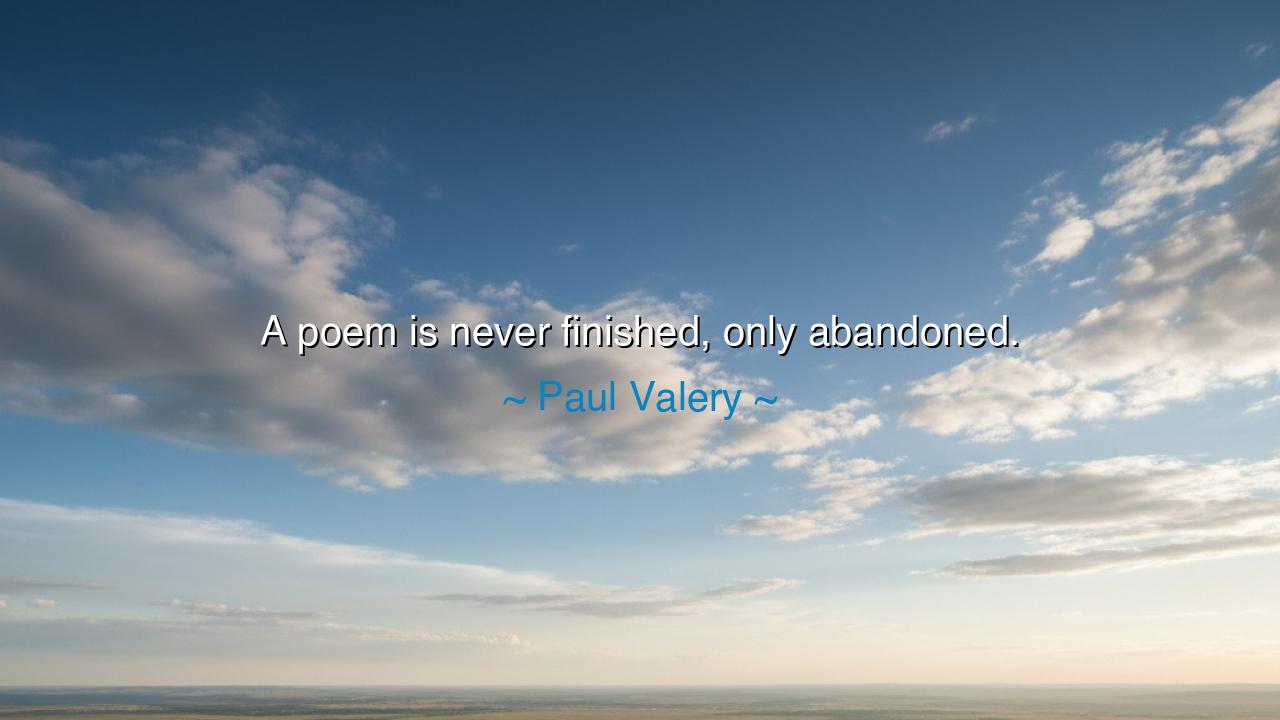
A poem is never finished, only abandoned.






Paul Valéry, the French poet and philosopher of subtle precision, once confessed: “A poem is never finished, only abandoned.” In this brief line, he unveiled the eternal struggle of every creator—the longing for perfection that can never be attained. For the poem, like the soul, is infinite in its possibilities. Each word could be changed, each line refined, each rhythm altered. Yet if the poet waits for completion, the work will never leave his hands. Thus he must, at last, lay it down—not perfect, but alive—and give it to the world.
The origin of this thought arises from Valéry’s own discipline and torment as a craftsman of words. He was known for endless revisions, for polishing his poems like jewels until their brilliance dazzled. Yet even he, with his meticulous devotion, understood that the perfect poem is an illusion. The poet’s vision always exceeds the form he gives it. There will always remain another nuance, another shade, another harmony that could have been. Thus, every poem is a fragment of infinity—never completed, only released when the poet has exhausted his strength or surrendered to time.
The ancients, too, struggled with this truth. Virgil, on his deathbed, commanded that the Aeneid be burned, for he felt it was not yet complete. Augustus refused, preserving it for posterity. What Virgil thought unfinished, the world received as one of its greatest epics. Here Valéry’s words echo: Virgil did not finish the Aeneid; he abandoned it. And in that abandonment, the poem began its immortal journey, touching hearts long after the poet’s hand was stilled.
Consider also Leonardo da Vinci, whose paintings—like the Adoration of the Magi or even the Mona Lisa—were worked upon for years and still deemed incomplete by his own judgment. He, too, knew that art is never finished, for the artist’s vision evolves faster than his hand. What we call masterpieces, he might have called fragments abandoned in time. The creator’s dissatisfaction is eternal, but the world sees beauty even in what the artist could not perfect.
Valéry’s insight also speaks to the nature of human life itself. Are we not all unfinished poems? Each of us is shaped by experiences, choices, and desires, constantly revised as time passes. Yet no one reaches perfection; we all are “abandoned” by life at the end, incomplete in our striving, yet leaving behind verses—acts of love, courage, failure, and hope—that become our testament. To live, like to write, is never to finish, but to abandon the work into the hands of history.
The lesson is clear: do not wait for perfection before you act, before you share, before you give. If you hold your song too long, it will never be heard. If you wait until the poem is flawless, it will never breathe in the world. Instead, embrace imperfection, for it is the mark of the human. Share your words, your work, your love, not because they are finished, but because they are true enough to matter now. Perfection is the horizon—always seen, never reached.
Practical action flows: when you create, set aside the fear of incompleteness. Revise, refine, labor—but know the time will come to let go. When you live, do not wait for the perfect moment; it will not come. Act now, with the strength and clarity you possess, even if imperfect. Trust that the world needs not your flawless creation, but your authentic offering.
So let Valéry’s words resound in our hearts: “A poem is never finished, only abandoned.” Take courage, creators of all kinds. Release your work before perfection strangles it. Release your life’s verse into the great poem of humanity. For it is not the perfect that endures, but the true—and even fragments, once abandoned, may shine as eternity’s light.






TLTrang Le
Valery’s statement about poems being 'abandoned' rather than finished got me thinking about the emotional connection poets have with their work. Perhaps there’s always a sense of doubt or uncertainty before a poem is released into the world. Does this mean that every poem carries with it a sense of the poet’s own struggle? How does this feeling of abandonment affect the final meaning or impact of a poem on the reader?
HThoang thu
I’m fascinated by the idea that poems are 'abandoned' rather than finished. Does that mean there’s always a lingering sense of imperfection in poetry? Valery’s perspective makes me question how much of the poet’s work is intentional versus a product of letting go at some point. What role does instinct play in the final version of a poem, and how much control does a poet really have over their own words?
KLkhanh linh
Valery’s quote seems to imply that the poet never truly feels satisfied with their work, which makes me think about the constant pursuit of perfection in art. If a poem is 'abandoned' rather than finished, is it possible that the poet never fully communicates what they intended? Or is it the nature of poetry to leave some things unsaid, leaving room for interpretation? How do you think this perspective affects the way we read and engage with poetry?
GDGold D.dragon
Paul Valery’s idea that a poem is never finished, only abandoned, really resonates with me. It suggests that poetry is an evolving process, never truly complete in the poet’s eyes. I wonder if this sense of perpetual incompleteness drives poets to constantly revise and refine their work. Does this mean that every poem, no matter how polished, could always be reworked in some way? And how does this affect the reader’s interpretation of a poem?